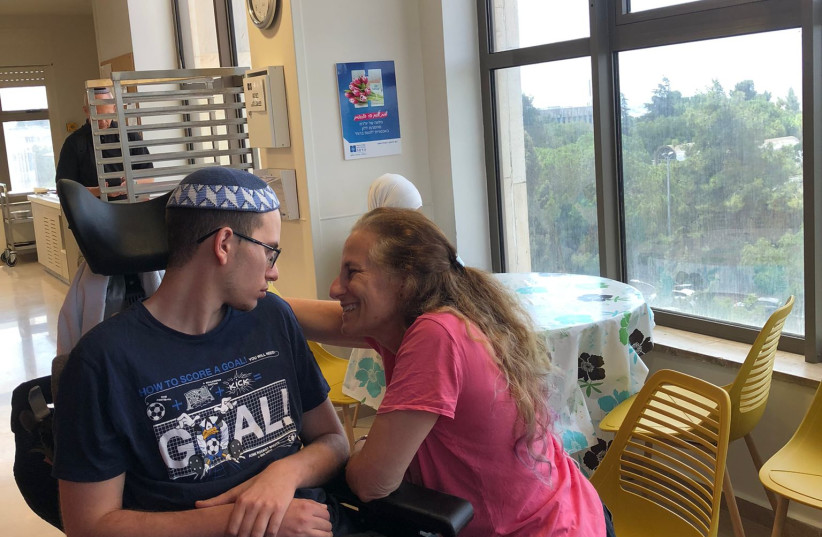Belev Echad’s New York trip also provided a respite for Judi Felber, mother of wounded-in-action Nathaniel, who took a bit of time off from her extensive involvement in his daily care to travel solo. She writes of how the organization has benefited them both:
I have a photo of my son, Nathaniel, lighting a hanukkiah on base with his army buddy on the eighth night of Hanukkah, 2018. He looks happy, confident, capable of anything in his uniform. Three days later, he lay in the ICU after a terror attack.
The doctors couldn’t tell us with confidence whether he would live or die, but one thing was sure: life would never be the same. Those initial days were torture.
How life has changed four years later
In the four years that have passed since that awful day, my life has changed completely. Friends and family helped us from the beginning. They visited us, supported us, really took care of us in ways I can’t even begin to thank them for. But there is something different when someone who has been through a similar experience becomes involved.
When a soldier is wounded, the injuries are not limited to just the soldier. The family is also affected. There are hospital stays to endure, medical decisions to consider, raw emotions to tolerate, and more. Mothers must do all of this without letting our injured child know how hard it is for us.

Go into the hospital room and smile and say that everything will be all right. Be supportive. Fight for the best treatments and therapies. Then leave the room and cry, exhausted, not knowing whether everything really will be okay. A mom’s day is only as good as her least happy child. If healing and rehab are going well, a mom is happy. If not, not. It’s not in our hands.
One day our child is happy, healthy, in great physical shape. In an instant, that all changes. They fall off the cliff of normal life. Climbing back up takes years of hard work and effort.
Everyone thinks of the wounded soldier. It’s natural. We see the soldier, we hear the tales of recovery, we see the scars. But behind every soldier is a mother who is hurting for her child. We mothers are often alone. There are organizations for wounded soldiers to get together for social events. They identify with each other. They can talk freely about what they went through with people who really understand.
That support seems lacking for mothers. We go about our day, but there is always this side of our life experience that is hard to explain and impossible for our friends to understand. No one is ever the same after going through something like this.
The wounded soldiers don’t want to have mommy around when they are with their friends. They’ve had enough of feeling dependent.
My son was severely wounded after a terrorist shot him in the head, and he still needs full-time care. He has amazing caregivers, but he’s still my son, and my husband and I are his official legal guardians.
I have been fortunate to go with my son to the Belev Echad Center and meet other wounded soldiers. Belev Echad is for and by wounded soldiers. Wounded soldiers run the house for other wounded soldiers. I just snuck in, but I have met a few other mothers of wounded soldiers there. It is a breath of fresh air to talk with someone who knows what it’s like to deal with seeing our children fighting for their life, dealing with medical and psychological issues. Unfortunately, there are not many opportunities like this.
This past November, Belev Echad took a group of wounded soldiers to New York City for a bit of fun. They have been sponsoring this annual trip for years. This year, I joined them on behalf of my son because he is not able to travel. I was a bit of an imposer into the lives of the soldiers, but let me tell you, it was so refreshing and rejuvenating to be away from the day-to-day responsibilities of my son and just walk around Manhattan without a care in the world.
I met amazing mothers who live in NYC and are involved with Belev Echad. They are not mothers of wounded soldiers, but they are mothers who care, and that meant a lot to me.
I think there is a great need for mothers of wounded soldiers to have an outlet, just like our kids do. I don’t mean therapy – just fun with other mothers whose children were wounded while serving their country. We may have a lot in common.
